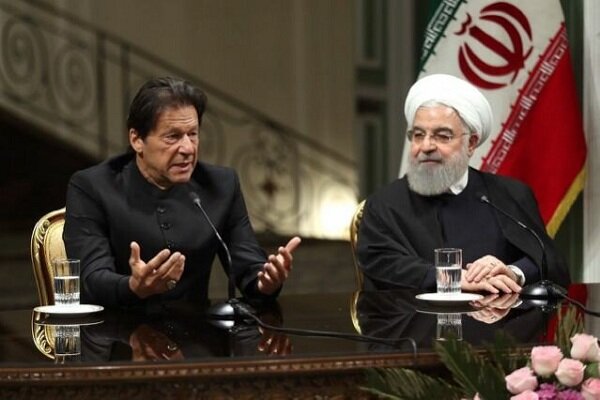Khan kicked off his much-anticipated visit from the holy city of Mashhad where he paid his obeisance at the highly revered shrine of Imam Reza (as).
The cricketer-turned-premier, who catapulted to fame as the captain of Pakistan’s World Cup winning cricket team in 90s, reaffirmed his commitment to strengthen ties between the two countries.
The relations between Iran and Pakistan have always been marked by ambiguity, mainly due to overt pro-Riyadh tilt of successive ruling dispensations in Islamabad over the years. But since Khan took over as the Prime Minister late last year, he has clearly and categorically spoken about his desire to balance ties between Tehran and Riyadh.
However, the recent terror attack in Iran’s restive Sistan-Baluchistan province, targeting a cavalcade of Iranian security forces, threatened to derail ties between the two countries. Iranian politicians and military generals issued strongly-worded statements, urging Pakistan not to allow its territory to be used for attacks against its close ally.
Khan’s growing proximity to Riyadh, like his predecessors, also raised concerns about Islamabad risking its relations with Iran, which made this visit more significant.
Upon his arrival in Mashhad, Khan sought to allay the fears of people in Iran that Pakistan would not compromise its historic and time-tested ties with Iran, its key ally and a regional bulwark.
Iran and Pakistan have more commonalities than differences. The evolution of global and regional security environment is pushing the two countries closer to each other. Further, the two countries can benefit vastly from mutual cooperation in economic, commercial, and security spheres.
Khan’s visit to Tehran came at a critical time when the two sides can take advantage of vast opportunities to enhance bilateral cooperation in various fields.
Before taking over as the premier of Pakistan, Khan repeatedly asserted that good relations with neighboring countries are in the best interests of Pakistan. He rose to power on the slogan of ‘Naya Pakistan’ (New Pakistan).
But, after assuming charge, he has been battling problems on multiple fronts, at domestic and international level. Many economic and security problems have engulfed him in recent months that has compelled him to change his core team. Beside, tensions with India, uncertainty in Afghanistan and constant saber-rattling of U.S. have dominated his nine months in power.
Khan is visiting Iran at a time when the border they share has become prone to infiltration by terrorists and border regions have become safe havens of notorious terrorist groups. It has got both these friendly Muslim countries concerned about the security of their borders.
Only three days before Khan’s visit to Iran, at least 14 members of Pakistan's security forces were killed in Balochistan province of Pakistan. It is clear that the attack was carried out by those who are not in favor of stronger Iran-Pakistan ties.
But Pakistan Foreign Minister Shah Mehmood Qureshi stirred the hornet’s nest saying that the terrorist outfits that carried out the attack have “training and logistic camps inside Iranian areas bordering Pakistan”. In such a situation, both countries should prioritize security and that was the main agenda of this visit, according to sources.
It is an undeniable fact that the enemies of Pakistan and Iran have always tried to disrupt relations between them. Both countries have geostrategic interests and other countries feel threatened by that.
Pakistan believes that cordial ties with Iran are important for regional economic prosperity and security. Closer cooperation between them is a source of strength and stability not only for the two counties but also for the region.
Khan also had a brief meeting with Seyyed Ali Khamenei, the Supreme Leader of Iran, in which the Leader indicated that the terrorist groups responsible for disturbing security on borders are backed by enemies’ money and arms. The anti-security moves at the frontiers of Iran and Pakistan seek to hurt the friendly relations between the two countries, he emphasized.
So, at a time when the enemies are creating roadblocks for the two countries, it is an ideal time to focus on commonalities and bolster ties. In order to promote bilateral relations, it is necessary to identify the enemy and get rid of it.
Pakistan-Iran economic and political relationship would improve only if the measures are taken to ensure better border management in coming years. Both the countries’ geo-strategic locations make them crucial for each other and for the region.
Pakistan and Iran also seem to have arrived at a common ground that a stable, independent, and economically resilient Afghanistan is important for peace and stability in the region.
There are many areas of cooperation between Iran and Pakistan and it is expected that during Khan’s tenure, the two countries would make use of all opportunities to enhance bilateral ties. They have to be on the same page to tackle multiple challenges imperiling their relations and regional stability.
Reported by Raghib Hussain. Writer is a student and researcher from Gilgit Pakistan, currently based in Tehran.
MNA/TT
